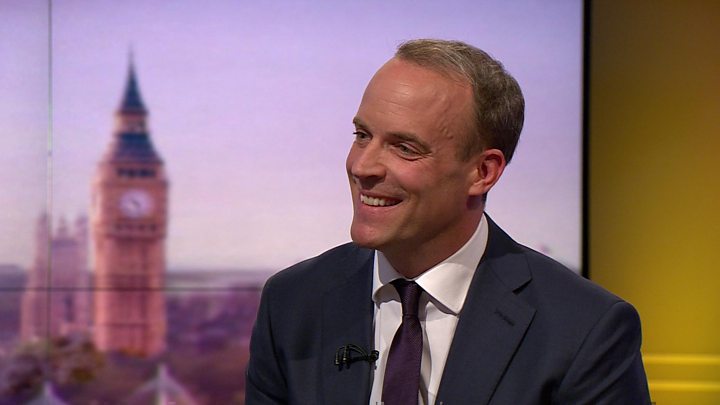
Media playback is unsupported on your device
Dominic Raab has been making his pitch to become Conservative leader, as Michael Gove becomes the eighth MP to join the race to succeed Theresa May.
Mr Raab told the BBC he would fight for a "fairer" Brexit deal with the EU - but if that were not possible, the UK would leave with no deal in October.
Mr Gove confirmed he would run to "deliver Brexit" and unite the party.
Chancellor Philip Hammond said it would be a "dangerous strategy" to ignore Parliament, which has opposed no-deal.
- Tory leadership contenders - who's standing?
- The people who will choose the UK's next prime minister
On Friday, Mrs May announced she would be standing down as Tory leader on 7 June, saying it was time for another prime minister to try to deliver Brexit.
It came after a backlash by her MPs against her plan to get the withdrawal deal she had negotiated with the EU through the Commons, which has already rejected it three times.
The UK is now set to leave the European Union on 31 October, after the original Brexit date of 29 March was delayed twice owing to the parliamentary deadlock.
The delay has meant the UK has had to take part in elections to the European Parliament, three years after it voted to leave the bloc.
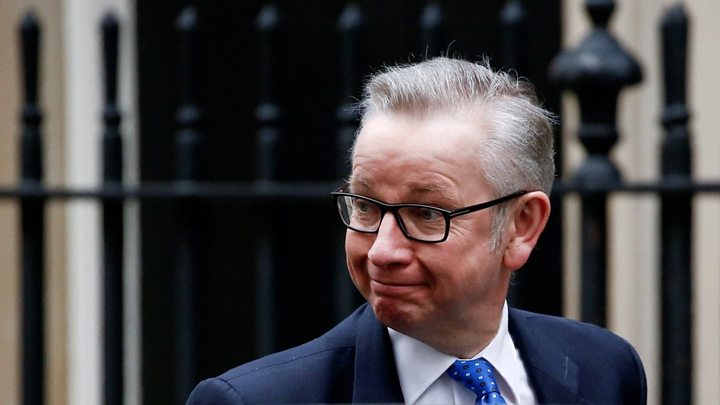
Media playback is unsupported on your device
Mr Gove, the environment secretary, confirmed on Sunday that he would run for leader, saying: "I believe that I'm ready to unite the Conservative and Unionist Party, ready to deliver Brexit, and ready to lead this great country."
He is expected to outline his pitch later on Sunday.
Former Brexit Secretary Dominic Raab and former Commons leader Andrea Leadsom revealed their leadership bids in the Sunday newspapers.
Mr Raab told the BBC's Andrew Marr Show that the UK's previous negotiations with the EU over the withdrawal agreement had not been "resolute" enough, and a no-deal Brexit had been taken "off the table".
"I would fight for a fairer deal in Brussels with negotiations to change the backstop arrangements, and if not I would be clear that we would leave on WTO [World Trade Organization] terms in October."
He added: "I don't want a WTO Brexit but I think unless you are willing to keep our promises as politicians… we put ourselves in a much weaker position in terms of getting a deal."
He said there was "no case for a further extension" past the current date the UK is due to leave the EU, 31 October, adding: "It is very difficult for Parliament now to legislate against no-deal, or in favour of a further extension, unless the executive, unless a resolute prime minister is willing to acquiesce in that - and I would not."
But Chancellor Philip Hammond called for compromise, saying the suggestion that it was possible to renegotiate the withdrawal agreement was a "fig leaf" for "what is actually a policy of leaving on no-deal terms".
That policy was clearly opposed by Parliament, he told the BBC's Andrew Marr Show.
"This is a parliamentary democracy. A prime minister who ignores Parliament cannot expect to survive very long," he warned.
Former work and pensions secretary Esther McVey told Sky's Sophy Ridge on Sunday: "31 October is the key date and we are coming out then, and if that means without a deal then that's what it means.
"We won't be asking for any more extensions. If Europe wants to come back to us, the door is open if they want a better deal."
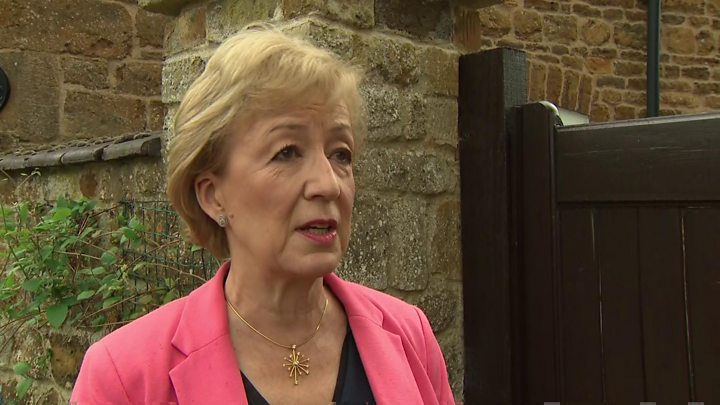
Media playback is unsupported on your device
Asked if she favoured a no-deal Brexit, Ms Leadsom said: "Of course, in order to succeed in a negotiation you have to be prepared to leave without a deal, but I have a three-point plan for Brexit, for how we get out of the European Union.
"I'm very optimistic about it. My role as leader of the Commons means that I've had a very good insight into what needs to be done, and I look forward to setting that out once the campaign starts."
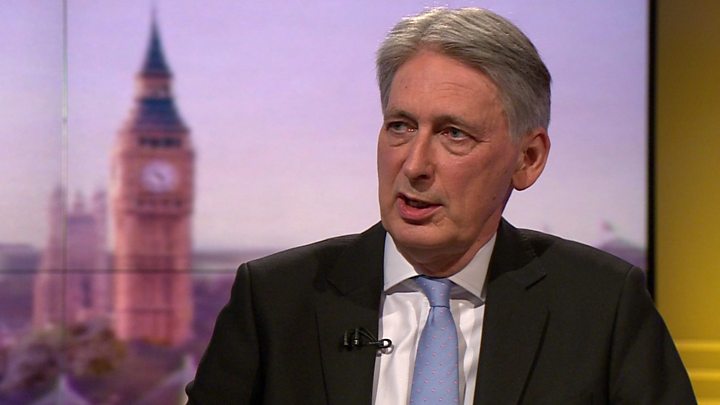
Media playback is unsupported on your device
They have joined Foreign Secretary Jeremy Hunt, his predecessor Boris Johnson, International Development Secretary Rory Stewart, and Health Secretary Matt Hancock in the battle for the leadership.
Tory MPs have until the week beginning 10 June to put their name forward, and the party hopes a new leader will be in place by the end of July.
Members will have the final say on who wins, after the shortlist is whittled down to two by a series of votes by Tory MPs.
In the Sunday Telegraph, party chairman Brandon Lewis said the party membership had swelled by 36,000 in the last year - bringing the total to more than 160,000.
Mrs May will continue as prime minister while the leadership contest takes place.
'A tantalising and fascinating contest'
Michael Gove's declaration sets up a tantalising and fascinating contest between two of the architects of the Leave campaign, who fell out so spectacularly during the contest to replace David Cameron immediately after the referendum three years ago.
Mr Gove had been supporting Boris Johnson to be prime minister - until he, "reluctantly but firmly" as he put it, concluded he himself should stand and Mr Johnson should stand aside.
This time, the two men will take each other on. But in these opening skirmishes of this campaign, what is emerging as the central fault line is the instincts of the candidates on a no-deal Brexit.
Some are willing to embrace it, others think it would be a disaster. The outlook of the eventual winner could shape our country for years to come.
Some candidates have stressed the need to get a Brexit deal through Parliament.
Mr Hunt told the Sunday Times he had the business experience to secure an agreement. "Doing deals is my bread and butter," he said.
And in a direct criticism of Boris Johnson, Mr Stewart said: "I would not serve in the cabinet of someone explicitly pushing for a no-deal Brexit."
Mr Hancock said Mrs May's successor must be "brutally honest" about the "trade-offs" required to get a deal through Parliament.
'Machiavelli' attack
Meanwhile, Labour's deputy leader Tom Watson told the Observer that his party must fully commit to supporting another referendum.
Speaking on BBC Radio 5Live's Pienaar's Politics, Unite general secretary Len McCluskey said the "usual suspects" would blame leader Jeremy Corbyn if Labour performed poorly in the European elections.
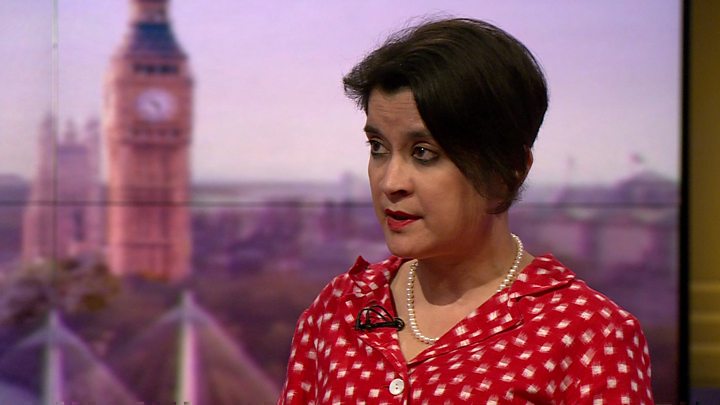
Media playback is unsupported on your device
He said: "Tom Watson's already out, surprise surprise, trying to take on the role of Prince Machiavelli, but I've got news for Tom. Machiavelli was effective. He's a poor imitation of that. If he's trying to turn Labour members against Corbyn and in his favour, then he's going to lose disastrously.
"Now is the time to hold your nerve, because a general election - which is the only thing that will resolve this situation - is closer now than anything."
https://www.bbc.com/news/uk-politics-48411784
2019-05-26 12:00:21Z
52780302735748

Tidak ada komentar:
Posting Komentar